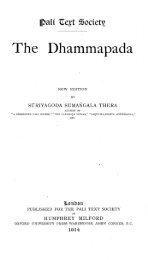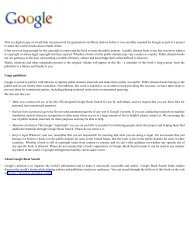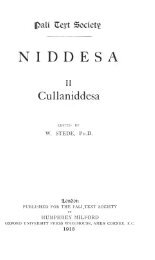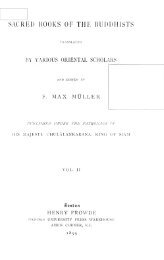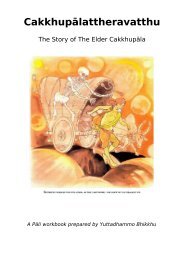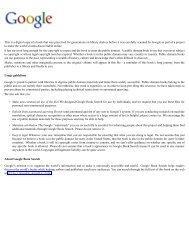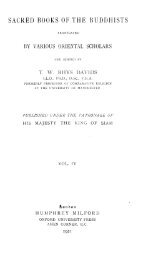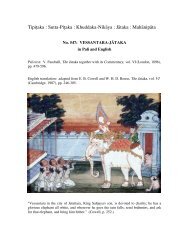Lessons In Practical Buddhism - Sirimangalo.Org
Lessons In Practical Buddhism - Sirimangalo.Org
Lessons In Practical Buddhism - Sirimangalo.Org
Create successful ePaper yourself
Turn your PDF publications into a flip-book with our unique Google optimized e-Paper software.
must look at it quite closely, which is all we are trying to do<br />
in meditation practice.<br />
When you observe experience objectively, you will see it<br />
clearly for what it is. If, when you observe reality, you come<br />
to see that it is truly, intrinsically worth something, then we<br />
have to throw the four noble truths out the window. The<br />
point is that when you do observe reality, you can't help but<br />
see the truth of suffering - that experience is truly unstable,<br />
unsatisfying and uncontrollable. This is what we see just by<br />
recognizing simple experiences like "stepping right". It's just<br />
a name for the movement, isn't it? The reality is the<br />
movement, but if you say, "moving, "moving", it becomes<br />
monotonous, so we break it up. Eventually we break the<br />
step up into two, three, or more parts, as in, "lifting",<br />
"placing" or "lifting", "moving", "placing"; they are just words<br />
that reify the experience, instead of proliferating it, as in 'this<br />
is good', 'this is bad', 'this is me', 'this is mine', 'this is right',<br />
'this is wrong'. We say, instead, 'this is this'.<br />
Once you see that it is what it is, then you see what it is.<br />
You say, "lifting", and you know this as "lifting". You don't<br />
see it as permanent, satisfying, or under your control. You<br />
see it as lifting, then it's gone. You do the same with<br />
feelings, the mind, the emotions and so on. This is the<br />
accumulation of wisdom. It's very simple, so we call it<br />
'simple wisdom'.<br />
The pursuit of wisdom is not some complex intellectual<br />
endeavour. We're just trying to know things fully, to<br />
understand things completely. This means that everything in<br />
our practice and in our lives is a fit and proper object of<br />
meditation practice - we must, in fact, take the whole of our<br />
experience as a meditation object. The real problem arises<br />
when we compartmentalize reality, so our meditation<br />
becomes only one part of our life, and during the rest of our<br />
life we don't think of the meditation at all; we may even<br />
compartmentalize the meditation practice itself, meditating<br />
on some objects of experience and avoiding or indulging in<br />
others.<br />
When we have pain we immediately try to adjust our<br />
position. When we have bad thoughts, we immediately try to<br />
push them away, thinking, "no, no stop, I'm trying to<br />
137



